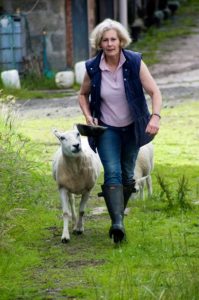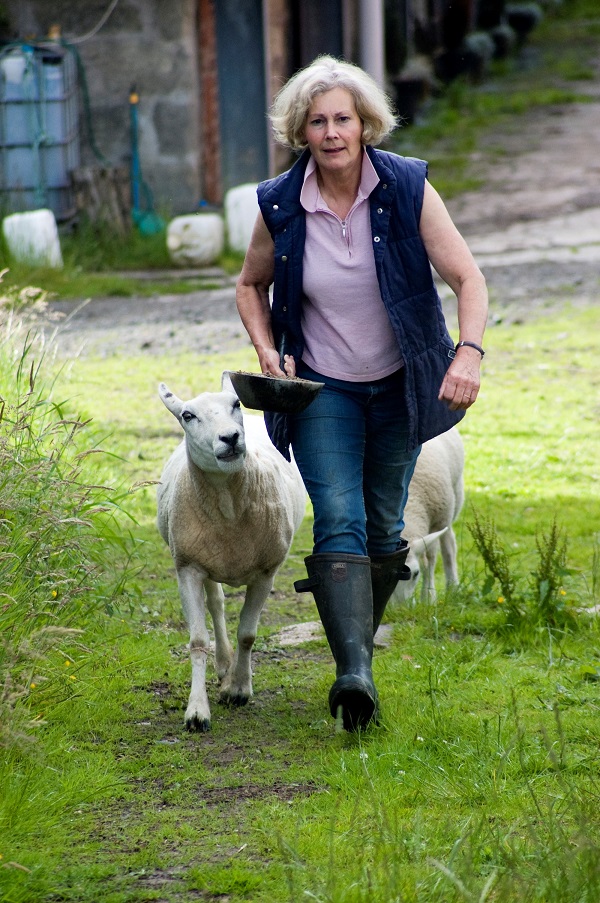Daye Tucker: Case study of one-to-one specialist advice
3 July 2018Support provided by the Farm Advisory Service: subsidised funding to commission a specialist advice report on biodiversity and conservation 
After support from FAS to produce an Integrated Land Management Plan (ILMP) about her 407-acre, all-grass stock farm, Daye Tucker, sought to build on the insight provided by commissioning an additional specialist advice report, focusing specifically on biodiversity and conservation. Now in the process of improving the pollen and nectar sources on the farm, as well as the diversity of wildlife within it, Daye reflects on the value of the specialist advice she received.
How did you get into farming?
‘I’ve always wanted to be a farmer, but I didn’t come from a farming background so there didn’t seem to be much hope of that becoming a reality. However, when my husband and I were both nearing retirement – he’s a vet and I was an art and design teacher – an opportunity to buy a property near where we live came up.
‘It was the home farm of what had been a large estate and was much more than we originally envisaged. Our independent financial adviser (IFA) at the time persuaded us to put in an offer and we managed to purchase the farm.
‘For the first few years, we rented out parts of the land on seasonal lets and ran a horse livery yard. Then, in 2005, we started a small sheep flock. As we grew the flock, we took more and more of the land back to use ourselves. Eventually, we took all the land back to accommodate the growing flock.’
Why did you apply for specialist advice?
‘Initially, I needed an ILMP to gain an overview of the whole farm, encompassing biodiversity and landscape potential. I then applied for a biodiversity review to know more about growing wild flowers and better managing the woodland and increasing wildlife on the farm.
‘We’ve got about 100 acres of woodland where very special ancient wild Scottish daffodils and bluebells grow, along with many other lovely woodland plants that I’d like to have more of. I’d also like to have more diverse grass and wild-flower pastures.’
How did you find the process of applying for funding through FAS?
‘It was simple and straightforward. Help was just a phone call or email away. It was world’s apart from what I’ve experienced in the past. Much more straightforward and efficient.
‘The application only took a few weeks to process.’
What did your adviser help you with?
‘We’ve got loads of mole hills and Sandra [FAS adviser] suggested that we get wild-flower seeds and scatter them on the molehills. She recommended Scotia Seeds [Ltd] in particular because they only supply seeds of Scottish provenance. As birds and wind help to spread seeds, we’re hoping that will encourage more wild-flower growth across the whole farm. Sandra’s report also provided advice on managing farm hedges, identifying the best sites for game crops, and how to avoid weedy patches of docks and thistles from growing.’
What benefits do you anticipate for your business as a result of the specialist advice report?
‘I think there will be a benefit to the wildlife on the farm, particularly the insects, bees and birds. When we first came here, the farm was devoid of pretty much everything except grass and cereals. Now, it has a different, gentler feel to it although it’s slightly wilder – and it’s definitely less industrial looking so that’s a landscape win.
‘We also have lots of woodland shelter belts surrounding the fields that aren’t very well-managed. I’m hoping that will change in time. I’d like to see more flowers and Sandra’s advice on thinning some of the woodlands will help achieve that.
‘I’d like to create an environment where the wild flowers spread more. Sandra said I need to do more mowing of the more aggressive weeds. So, it’s not just a question of sowing the seeds. They also have to be managed
Would you recommend specialist advice to other farmers?
‘Definitely, because every now and then it’s good to stop and take a look around. Get some fresh eyes in to look at everything. These are challenging times for us and the time is right to take stock and re-evaluate.
‘From what I’ve experienced, FAS is far superior to the older, previous advisory schemes.
Would you recommend FAS support services to other farmers?
‘Definitely. The FAS team seems to really care what people think and ask for their opinions.
‘FAS is much more user-friendly and efficient than previous schemes.’
What advice would you give to others seeking help with an ILMP?
‘I would advise them to contact FAS in the first instance because it’s free. Prior to FAS, we had to pay consultants to put in applications before we even got going. Older schemes were too prescriptive and didn’t always fit with the farm.
‘FAS can signpost you to more specialist advice if you want to take things further and hire somebody. You have a choice.’
Sign up to the FAS newsletter
Receive updates on news, events and publications from Scotland’s Farm Advisory Service

